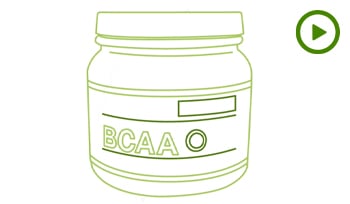5 suurta syytä rakastaa heraproteiinia

Hera on juuston valmistusprosessin luonnollinen sivutuote. Lehmänmaidossa on noin 6,25% proteiinia. Tästä proteiinista 80% on kaseiinia (toinen proteiinityyppi) ja loput 20% heraa. Kun juustoa valmistetaan, se käyttää kaseiinimolekyylejä, jotka jättävät heran taakse. Heraproteiinia valmistetaan suodattamalla pois heran muut komponentit, kuten laktoosi, rasvat ja mineraalit. Heraproteiini on liukoinen, helposti sulava ja imeytyy tehokkaasti kehoon. Kun se otetaan ennen ateriaa, se parantaa verensokerin hallintaa.
1. Proteiinin laatu
Heraproteiinilla on korkein biologinen arvo kaikista proteiineista. Proteiinin laadun arvioimiseksi tutkijat mittaavat aminohappojen osuuden, jotka imeytyvät, säilyvät ja käytetään kehossa proteiinin biologisen arvon (BV) määrittämiseen.
Heraproteiini on täydellinen proteiini, koska se sisältää kaikki välttämättömät ja ei-välttämättömät aminohapot. Yksi keskeisistä syistä, miksi heraproteiinin BV on niin korkea, on se, että siinä on korkeimmat pitoisuudet glutamiinia ja haarautaketjuisia aminohappoja (BCAA) , joita löytyy luonnosta. Glutamiini ja haarautuneet aminohapot ovat kriittisiä solujen terveydelle, lihasten kasvulle ja proteiinisynteesille.
2. Se sisältää runsaasti glutamiinia
Glutamiini, kehon runsain aminohappo, osallistuu enemmän aineenvaihduntaprosesseihin kuin mikään muu aminohappo.Glutamiini on tärkeä polttoaineen lähteenä valkosoluille ja nopeasti jakautuville soluille, kuten suolistoa reunustaville soluille. Glutamiinilisäyksen on osoitettu parantavan mahahaavoja, parantavan energiatasoa, tehostavan immuunitoimintaa ja torjuvan infektioita.
Vaikka kehonrakentajat ja urheilijat käyttävät heraproteiinia lisätäkseen proteiinin saantiaan, melkein kaikki voivat hyötyä lisäämällä heraproteiinia ruokavalioonsa. Heraproteiini on erityisen tärkeä apuna painonpudotuksessa, ravitsemuksellisena tukena leikkauksesta toipumiselle ja kompensoimaan joitain sädehoidon ja kemoterapian kielteisiä vaikutuksia.
Tutkimukset ovat osoittaneet, että liikuntaa harjoittavat henkilöt hyötyvät ruokavaliosta, jossa on paljon välttämätöntä aminohappoa leusiinia ja heillä on enemmän vähärasvaista lihaskudosta ja vähemmän kehon rasvaa verrattuna niihin, joiden ruokavalio sisältää alhaisempaa leusiinipitoisuutta. Heraproteiinikonsentraateissa on noin 50% enemmän leusiinia kuin soijaproteiini-isolaatilla.
3. Heraproteiini lisää glutationitasoja
Heraproteiinin on osoitettu tehostavan immuunitoimintaa nostamalla tärkeän antioksidantin glutationin tasoa, jota löytyy kaikista soluista, mukaan lukien valkosolut. Riittävä glutationitaso on kriittinen immuunijärjestelmän moitteettoman toiminnan kannalta. Immuunisoluissa glutationi stimuloi vasta-aineiden tuotantoa ja valkosolujen kykyä niellä ja tuhota tunkeutuvia organismeja.
Glutationi osallistuu myös kehon vieroitusreaktioihin ja pystyy sitoutumaan rasvaliukoisiin toksiineihin, kuten raskasmetalleihin, liuottimiin ja torjunta-aineisiin, muuttamalla ne vesiliukoiseen muotoon, mikä mahdollistaa tehokkaamman erittymisen munuaisten kautta. Lisäheraproteiinin syöminen on yksi parhaista tavoista nostaa glutationitasoja kehossa ja auttaa tehokkaassa vieroituksessa.
4. Whey Promote on laihduttajan ystävä
Heraproteiinin nauttimisen on osoitettu vähentävän nälän tunteita ja edistävän kylläisyyttä, mikä tekee siitä arvokkaan avun painonpudotusohjelmissa. Se sisältää bioaktiivisia komponentteja, jotka auttavat stimuloimaan kolmen ruokahalua hillitsevän suolistohormonin vapautumista: kolekystokiniini (CCK), peptidi tyrosiini-tyrosiini (PYY) ja glukagonin kaltainen peptidi-1 (GLP-1).
Yksi parhaista strategioista heraproteiinin hyödyntämiseksi on sen ottaminen ennen ateriaa tai aterioiden välillä. Tutkimukset ovat osoittaneet, että heraproteiinin kulutus pieninä määrinä ennen ateriaa parantaa aterioiden jälkeistä verensokerin hallintaa ja johtaa myös parempaan kylläisyyteen ja ruokahalun hallintaan. Monet näistä eduista ovat seurausta heran bioaktiivisista komponenteista, jotka stimuloivat suolistossa olevien kolmen ruokahalua hillitsevän hormonin vapautumista: kolekystokiniini (CCK), peptidi tyrosiini-tyrosiini (PYY) ja glukagonin kaltainen peptidi-1 (GLP-1). Vakauttamalla verensokeritasoja ja vähentämällä nälkää laihduttaminen on helpompaa ja menestys todennäköisempää.
Vegaaniset proteiinilähteet eivät näytä pystyvän toistamaan näitä painonpudotusetuja. Yhdistyneessä kuningaskunnassa Birminghamin yliopistossa tehdyssä tutkimuksessa 40 ylipainoista miestä ja naista suoritti 14 päivän kalorirajoitetun ruokavalion ja heidät määrättiin satunnaisesti kaksoissokkona saamaan kahdesti päivässä eristettyä heraa (27 g) tai soijaa (26 g) tai maltodekstriiniä (25 g). Käyttämällä verimittausta lihaskuitujen synteesiin tulokset osoittivat, että lihasten hajoaminen oli merkittävästi vähemmän heraproteiiniryhmässä kuin soija- ja maltodekstriiniryhmissä. Itse asiassa soijaproteiinilla ei ollut vaikutusta lihasten menetyksen vähentämiseen. Nämä tulokset osoittavat, että heraproteiinilisä voi auttaa säilyttämään lihasmassaa painonpudotuksen aikana.
5. Heraproteiini torjuu ikääntymistä
Yksi ehkäistävimmistä ikääntymiseen liittyvistä muutoksista on lihasmassan ja voiman menetys, jota kutsutaan sarkopeniaksi. Sarkopenia on lihasmassalle mitä osteoporoosi on luille. Vaikka osteoporoosi saa kaiken median huomion, sarkopenia on merkittävämpi tekijä. Sarkopenia-aste on fyysisen vamman tärkein ennustaja, ja se liittyy heikentyneeseen elinvoimaan, huonoon tasapainoon, kävelynopeuteen, putoamisiin ja murtumiin, etenkin vanhuksilla.
Aivan kuten vahvojen luiden rakentaminen nuorena on tärkeää osteoporoosin estämisessä myöhemmässä elämässä, lihasmassan rakentaminen ja ylläpitäminen on välttämätöntä sarkopenian välttämiseksi. Lihasmassa kasvaa koko lapsuuden ajan ja huipentuu loppuvaiheessa teini-ikäisenä 20-luvun puoliväliin ja loppuun. Sen jälkeen alkaa hidas lihasmassan lasku. 25-50-vuotiaana lihasmassan lasku on noin 10%. 50-luvulla laskuvauhti kiihtyy hieman, mutta todellinen lasku alkaa yleensä 60 vuoden kuluttua. Kun ihminen saavuttaa 80 -vuotiaana, hänen lihasmassansa on hieman yli puolet siitä, mitä se oli parikymppisenä. Heraproteiinin ottaminen ja painonkantaharjoitusten harjoittaminen ja painojen nostaminen voivat auttaa säilyttämään lihasmassan ja voivat jopa auttaa sarkopeniaa sairastavia jälleenrakentamaan.
Kuinka saada enemmän heraa ruokavalioon
Tarvitsemasi heraproteiinin määrä riippuu aktiivisuudesta. Jos olet aktiivinen ja treenaat säännöllisesti, suositellaan usein 50 g heraproteiinia päivittäin. Jos harjoittelet harvoin, suositeltu saanti on 25 g päivässä.
Helpoin tapa käyttää heraa on lisätä herajauhetta smoothieihin tai juomaseoksiin. Heraproteiinijauhetta on saatavana useissa makuissa, mukaan lukien vanilja, suklaa ja mansikka, saatavana ennalta mitattuina yksittäisinä tarjoilupaketeina ja irtotavarana.
Korkeinta laatua kutsutaan usein mikrosuodatetuiksi tai ultrasuodatetuiksi heraproteiinikonsentraateiksi. Ja tietenkin, kun haluat ostaa heraproteiinia, valitse tuotteita, jotka eivät sisällä paljon sokeria tai elintarvikelisäaineita.
VASTUUVAPAUSLAUSEKE:Tämän hyvinvointiblogin tarkoituksena ei ole tarjota diagnooseja...



























































































